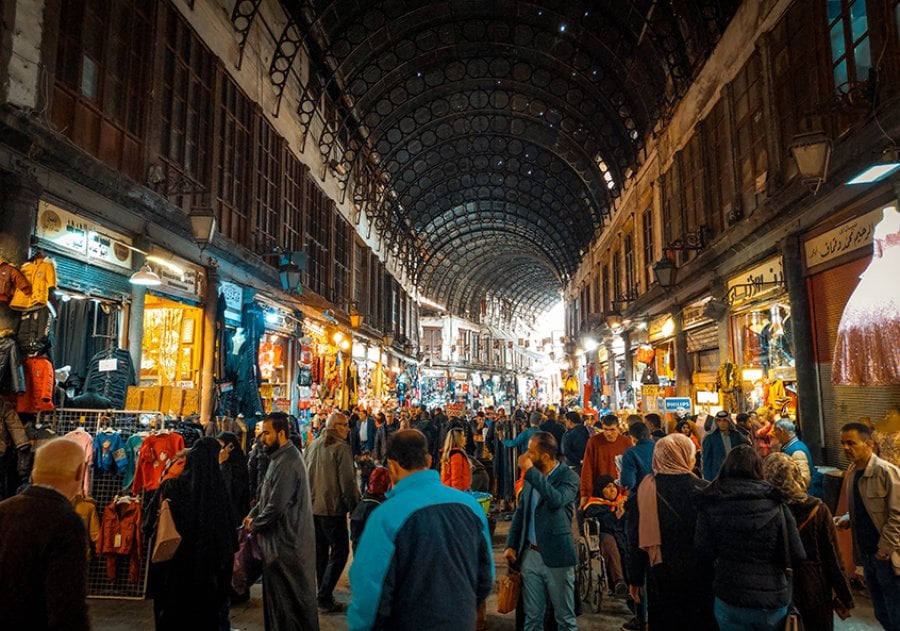
Crowds at the old Damascus market in Syria. Photo: Mahmoud Sulaiman
The impact of the COVID-19 pandemic in Syria has been exacerbated by fragmented governance, ongoing financial hardship, stretched health systems and continued insecurity and violence. Despite this, COVID-19 research in Syria is relatively limited, especially research related to the communities’ experiences, given the active role that communities can play in disease control.
In a first effort to explore how ordinary Syrians experienced COVID-19 responses across the three main areas of control in Syria, our research published in the PLOS ONE Journal highlighted similarities and differences in a country divided by a protracted conflict.
The qualitative study is led by former Syrian health workers with insider knowledge of the Syrian conflict and health system. We interviewed 22 purposively-sampled Syrians in government-controlled areas (GCA), opposition-controlled areas (OCA), and Autonomous Administration-controlled areas (AACA) in 2021, making sure to provide equal representation by governance area and gender where possible.
The data were analysed thematically and the study results are organised under the following themes:
- reduced fear of COVID-19 over time,
- difficulties adhering to non-pharmaceutical interventions (NPIs), such as people living in small family tents and sharing toilets being asked to wear masks, and asking daily-wage earners to self-isolate without compensation,
- unreliable COVID-19 information sources,
- limited community-based responses,
- vaccination hesitancy.
We found that participants were more worried about income loss than COVID-19 infection, which seemed understandable considering the precarity of most people’s lives in Syria, the challenges caused by NPIs that threatened education and livelihoods and the lack of safety nets provided by the government or other actors. Additionally, the impact of the pandemic meant that the remittances that support many Syrians inside the country were reduced.
“People didn’t have options; the majority of people are obliged to work. They either get infected with COVID-19 or they and their children die from hunger. So, people chose to continue working. They said if we get infected then it is our fate,” said a male NGO staff in OCA.
“People are scared they might get infected, but they just cannot afford not going to work,” said a male NGO staff in AACA.
Health authorities and international partners in each area implemented various NPIs; including border and school closures, facemasks, curfews, self-isolation, and quarantining in community isolation centres.
Participants in GCA and to a lesser extent in AACA indicated that the absence of effective community engagement by local authorities and the lack of accounting for people’s socioeconomic realities resulted in inappropriate NPIs. At the same time, participants in OCA mentioned the lack of coordination and consistency between multiple authorities and actors.
This meant people were less likely to adhere to the measures put in place and led to many of them establishing their own prevention measures at the household or individual level.
The study shows the importance of religion as a health determinant; participants stated that faith was a powerful motivator and justification. We found that Islam was used to both encourage and discourage prevention efforts against COVID-19. This finding has emphasised the value of communication that includes religious leaders in social mobilisation and correcting misinformation about COVID-19.
“What helped us to adhere to lockdown measures is our belief in Islam. Prophet Mohammed (Peace Be Upon Him) was asked [what to do] when an outbreak happened. He told people to stay home,” said a woman in GCA.
The rollout of COVID-19 vaccines started in May 2021 and is supported mainly by COVAX. Reports have shown that Syria is among the countries with the lowest COVID-19 vaccination coverage worldwide. COVID-19 vaccine hesitancy and resistance were noticed among participants due to unreliable information shared on social media, years of mistrust in authorities, and rumours circulating within communities.
“In general people aren’t excited about the vaccine. Rumours say that Russia will send the vaccine to kill us all,” said a woman in OCA.
Governments and authorities should be responsible for providing the correct and necessary information to protect and promote the population's health. Authorities in many countries, including Syria, failed to be transparent during the pandemic about cases, deaths, recovered cases, progress on vaccine development, and growing understanding of the disease which could have reduced anxiety and confusion. Thus pandemic responses across Syria were disconnected from the realities and needs of the people. The ignorance and rejection of public health measures result from poor community engagement across Syria, where NPIs did not address people’s fears, consider basic socioeconomic needs, or actively seek to improve trust or correct misinformation.
Based on our findings, we discussed the implications for policymakers and practitioners; which mainly included:
- Community members must be regarded as partners or leaders to improve adherence to public health measures; engaging with them should be a two-way learning process, including informing, consulting, involving, collaborating, and empowering.
- The "one-size-fits-all” approach should be avoided to ensure the needs of the most marginalised are included.
- More investment is needed in the coproduction of communication campaigns to reach Syrians with accurate health messages using appropriate and accessible social media platforms.
- COVAX partners must consider appropriate and meaningful community engagement that addresses the root issues of vaccine hesitancy across different areas of control in Syria.
If you enjoyed this article and would like to build a career in global health, we offer a range of MSc programmes covering health and data, infectious and tropical diseases, population health, and public health and policy.
Available on campus or online, including flexible study that works around your work and home life, be part of a global community at the UK's no.1 public health university.
